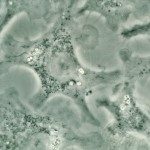Lien vers Pubmed [PMID] – 24498223
PLoS ONE 2014;9(1):e87927
Staphylococcus aureus is a major human opportunistic pathogen responsible for a broad spectrum of infections ranging from benign skin infection to more severe life threatening disorders (e.g. pneumonia, sepsis), particularly in intensive care patients. Scavenger receptors (SR-A and CD36) are known to be involved in S. aureus recognition by immune cells in addition to MARCO, TLR2, NOD2 and α5β1 integrin. In the present study, we further deciphered the contribution of SR-A and CD36 scavenger receptors in the control of infection of mice by S. aureus. Using double SR-A/CD36 knockout mice (S/C-KO) and S. aureus strain HG001, a clinically relevant non-mutagenized strain, we showed that the absence of these two scavenger receptors was protective in peritoneal infection. In contrast, the deletion of these two receptors was detrimental in pulmonary infection following intranasal instillation. For pulmonary infection, susceptible mice (S/C-KO) had more colony-forming units (CFU) in their broncho-alveolar lavages fluids, associated with increased recruitment of macrophages and neutrophils. For peritoneal infection, susceptible mice (wild-type) had more CFU in their blood, but recruited less macrophages and neutrophils in the peritoneal cavity than resistant mice. Exacerbated cytokine levels were often observed in the susceptible mice in the infected compartment as well as in the plasma. The exception was the enhanced compartmentalized expression of IL-1β for the resistant mice (S/C-KO) after peritoneal infection. A similar mirrored susceptibility to S. aureus infection was also observed for MARCO and TLR2. Marco and tlr2 -/- mice were more resistant to peritoneal infection but more susceptible to pulmonary infection than wild type mice. In conclusion, our results show that innate immune receptors can play distinct and opposite roles depending on the site of infection. Their presence is protective for local pulmonary infection, whereas it becomes detrimental in the peritoneal infection.

